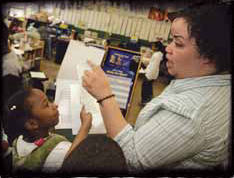Tactics for What They Teach
When it comes to teaching, Chandra Williams will be the first to tell you that idealism isn't enough.
Williams is a 29-year-old, fiercely determined African American woman who became a teacher because she wanted to give poor kids a better shot at making it in society. But four years ago, clocking 12-hour days at an inner-city public school in
That was when she decided to apply to Teachers College. "Through the trauma and the crying, I still knew that I wanted to be a teacher. Finally, I said to myself, 'These kids deserve better.'"
Williams graduated in 2005 with a master's degree in elementary education - and a clear perspective on how to do her job. Today, she teaches at Central Park East, an elementary school in
It's a great story-'"but one that's all too rare. Study after study has shown that nothing makes a bigger difference in student achievement than the grown-up at the front of the classroom - yet in poor communities nationwide, highly-trained teachers like Chandra Williams are in desperately short supply. Research has shown that poor children and children of color are more likely to be taught by unqualified teachers than other children. Secondary school students in high-poverty areas are twice as likely as those in low-poverty areas to have teachers who are not licensed in the subjects they teach; and students in high-poverty and high-minority schools are more likely to be taught by inexperienced teachers, by newcomers with no practice-teaching experience or even by a string of substitute teachers.
Much of this is a simple function of money. According to a 2005 report by a special New York City Council commission co-chaired by TC President Arthur Levine, the ability to attract better teachers belongs to districts that offer the highest salaries. For example, in 2003-04, a
TC is working to change this dismal picture, both through the preparation of top-notch teachers like Williams and through spirited dialogue with policymakers and elected officials.
The College's various pre-service teaching programs share an "inquiry-based" approach aimed at leading children to discover fundamental truths through questions and activities rooted in everyday life.
"At TC, we see it as our job to develop what's known as -'pedagogical content knowledge'-'"ways of learning, knowing and doing in your chosen discipline," says A. Lin Goodwin, Associate Dean for Teacher Education and School-Based Support. "Basically we're saying to our pre-service teachers, -'So you majored in physics-'"great, but how will you bring that down to the ninth grade level?' Because anyone who knows something can be a talking textbook, but you've got to have a variety of strategies to get that content across to young people from different backgrounds."
TC also emphasizes an embrace of multiple perspectives on culture, content and context, and a commitment to social justice.
"'Social justice,' as we define it, means being committed to providing all children, especially those who historically have been underserved, a quality education," Goodwin says. "It also means educating our students to be aware of how institutionalized racism works to create barriers for poor children, children of color and all those whom society terms 'different.'"
As an extension of that outlook, nearly 90 percent of TC's pre-service teaching students do their field placements in
But there's also a political aspect to getting more great teachers situated in struggling schools, and TC hasn't shrunk from it. The City Council commission co-chaired by Levine reported that the single most important thing the city could do with additional school funds is to bring more high-quality teachers into struggling schools. The commission recommended creating a new career ladder for teachers, with pay incentives for those who take on the toughest teaching assignments.
Levine, together with Congressman Charles Rangel, reiterated those recommendations this past September during negotiations between the Mayor's office and
Meanwhile, Chandra Williams is putting her TC education to good use. In part, that's meant building on the lessons of a game called "Reality Check" that she created during her Washington days, in which children use the Internet to learn what different jobs pay and what it costs to rent an apartment, buy food, and procure other necessities.
"Money ties together social justice, classism and mathematics," she says. "For example, a lot of kids aren't aware of simple information about banks. They'll see friends and relatives go to check-cashing places and pay high fees there, and just assume that's how it is."
Her message, of course, is the one that all great teachers deliver: It doesn't have to be that way.
Published Wednesday, Sep. 20, 2006
